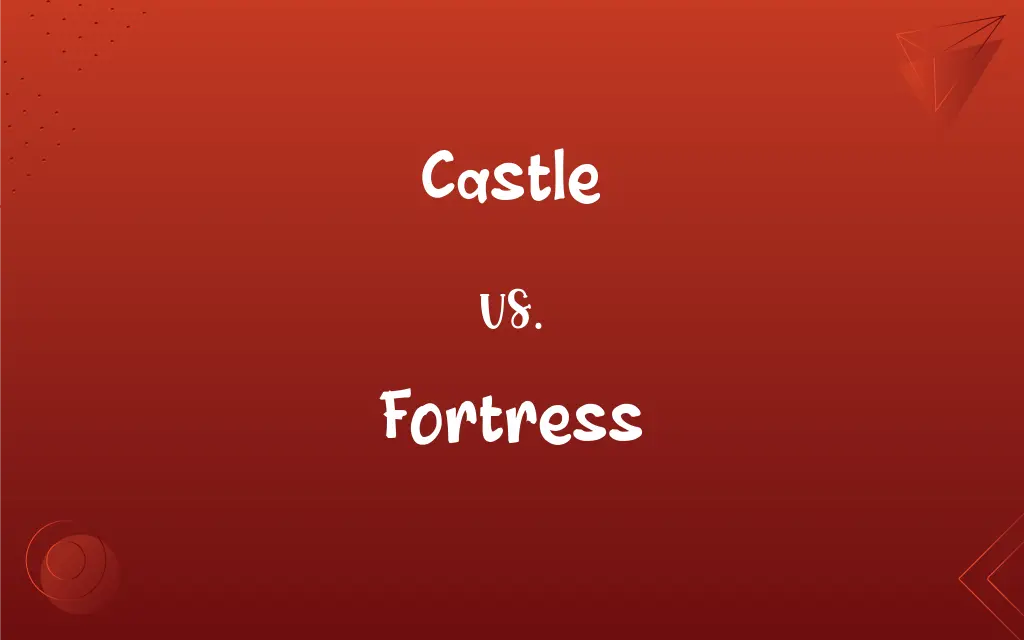Castle vs. Fortress: What's the Difference?
Edited by Harlon Moss || By Janet White || Updated on October 5, 2023
"Castle" is a large fortified residence primarily for nobility, while a "Fortress" is a heavily fortified place built primarily for defense against enemies.

Key Differences
Castle and Fortress both refer to large fortified structures, but they have distinct purposes. A Castle traditionally served as a residence for nobility or royalty, offering protection while also being a symbol of power and prestige. In contrast, a Fortress was primarily constructed for military defense and didn't necessarily serve as a long-term residence.
While both Castle and Fortress have defensive elements like walls, battlements, and moats, the former often showcases architectural beauty, with luxurious interiors, gardens, and sometimes even chapels. A Fortress would prioritize strategic advantages, often lacking the elegance and comfort of a castle.
The inhabitants and users of the two structures differ. Castle occupants often included the noble family, their servants, and sometimes a small garrison. Meanwhile, a Fortress would primarily house soldiers and military equipment, prepared to fend off invaders.
Locations of these structures were chosen based on their intended purpose. Castles might be located near important trade routes, towns, or in picturesque landscapes, while a Fortress was often situated in strategic positions like mountain passes, coastal cliffs, or river crossings to repel enemy forces.
Over time, the distinction between a Castle and a Fortress blurred, especially when castles were strengthened for military purposes. Yet, historically and architecturally, the core differences stem from their primary functions—residence versus defense.
ADVERTISEMENT
Comparison Chart
Primary Purpose
Residence for nobility or royalty with defensive features
Primarily for military defense
Architectural Focus
Balance of defense and elegance
Strictly defensive with strategic design
Inhabitants
Noble families, servants, sometimes a garrison
Soldiers and military equipment
Typical Location
Near trade routes, towns, picturesque landscapes
Strategic points: mountain passes, coasts, river crossings
Evolution
Developed into luxurious homes with defenses
Remained primarily military in nature
ADVERTISEMENT
Castle and Fortress Definitions
Castle
A structure with defensive features like walls and moats.
The castle's high walls deterred invaders.
Fortress
A heavily fortified place built for defense.
The fortress stood unconquered for centuries.
Castle
A large fortified residence for nobility.
The king lived in a grand castle on the hill.
Fortress
A military stronghold often in strategic locations.
The fortress guarded the mountain pass.
Castle
A large fortified building or group of buildings with thick walls, usually dominating the surrounding country.
Fortress
A place of safety during wartime.
The townspeople sought refuge in the fortress.
Castle
A fortified stronghold converted to residential use.
Fortress
A structure prioritizing security over comfort.
The fortress had thick walls and narrow windows.
Castle
A large ornate building similar to or resembling a fortified stronghold.
Fortress
A fortified place, especially a large, permanent military stronghold that often includes a town.
Castle
A place of privacy, security, or refuge.
Fortress
A fortified place; a large and permanent fortification, sometimes including a town; for example a fort, a castle; a stronghold; a place of defense or security.
Castle
(Games) See rook2.
Fortress
(chess) A position that, if obtained by the weaker side, will prevent penetration by the opposing side, generally achieving a draw.
Castle
To move the king in chess from its own square two empty squares to one side and then, in the same move, bring the rook from that side to the square immediately past the new position of the king.
Fortress
(transitive) To furnish with a fortress or with fortresses; to guard, to fortify.
Castle
To place in or as if in a castle.
Fortress
A fortified place; a large and permanent fortification, sometimes including a town; a fort; a castle; a stronghold; a place of defense or security.
Castle
(Games) To move (the king in chess) by castling.
Fortress
To furnish with a fortress or with fortresses; to guard; to fortify.
Castle
A large residential building or compound that is fortified and contains many defences; in previous ages often inhabited by a nobleman or king. Also, a house or mansion with some of the architectural features of medieval castles.
Fortress
A fortified defensive structure
Castle
(chess) An instance of castling.
Fortress
Often larger and more robust than regular forts.
The island's fortress was a marvel of military architecture.
Castle
A rook; a chess piece shaped like a castle tower.
Castle
(shogi) A defense structure in shogi formed by defensive pieces surrounding the king.
Castle
(obsolete) A close helmet.
Castle
(dated) Any strong, imposing, and stately palace or mansion.
Castle
(dated) A small tower, as on a ship, or an elephant's back.
Castle
The wicket.
Castle
(transitive) To house or keep in a castle.
Castle
To protect or separate in a similar way.
Castle
(obsolete) To make into a castle: to build in the form of a castle or add (real or imitation) battlements to an existing building.
Castle
To move the king 2 squares right or left and, in the same turn, the nearest rook to the far side of the king. The move now has special rules: the king cannot be in, go through, or end in check; the squares between the king and rook must be vacant; and neither piece may have been moved before castling.
Castle
To create a similar defensive position in Japanese chess through several moves.
Castle
(cricket) To bowl a batsman with a full-length ball or yorker such that the stumps are knocked over.
Castle
A fortified residence, especially that of a prince or nobleman; a fortress.
The house of every one is to him castle and fortress, as well for his defense againts injury and violence, as for his repose.
Our castle's strengthWill laugh a siege to scorn.
Castle
Any strong, imposing, and stately mansion.
Castle
A small tower, as on a ship, or an elephant's back.
Castle
A piece, made to represent a castle, used in the game of chess; a rook.
Castle
To move the castle to the square next to king, and then the king around the castle to the square next beyond it, for the purpose of covering the king.
Castle
A large and stately mansion
Castle
A large building formerly occupied by a ruler and fortified against attack
Castle
(chess) the piece that can move any number of unoccupied squares in a direction parallel to the sides of the chessboard
Castle
Interchanging the positions of the king and a rook
Castle
Move the king two squares toward a rook and in the same move the rook to the square next past the king
Castle
A symbol of power and prestige in medieval times.
Owning a castle was a mark of nobility.
Castle
A building often associated with medieval Europe.
Europe is dotted with historic castles.
Castle
An architectural blend of defense and elegance.
The castle's gardens were as impressive as its battlements.
FAQs
Can a castle be a fortress?
Yes, especially if it's heavily fortified and used for military defense.
Are "Castle" and "Fortress" synonyms?
They both refer to fortified structures, but a castle is often a residence while a fortress is primarily for defense.
Do castles always have moats?
Not always, but moats were a common defensive feature for many castles.
Why build a fortress in a mountain pass?
To control and defend a strategic point, preventing enemy movement.
Can a fortress serve as a residence?
While primarily for defense, some fortresses might have had residential quarters for commanders.
Are castles always made of stone?
Many were, especially in medieval Europe, but materials varied based on location and era.
How did castles evolve over time?
They transitioned from primarily defensive structures to more luxurious residences while maintaining defensive features.
Can fortresses be found outside Europe?
Yes, fortresses have been built worldwide, wherever strategic defense was necessary.
Is a fortress always bigger than a fort?
Often, yes. "Fortress" suggests a larger and more robust structure than a typical fort.
Were castles only for the wealthy?
Primarily, as they were symbols of power and prestige, mostly owned by nobility or royalty.
Is a palace the same as a castle?
No, while both can be grand residences, palaces aren't necessarily fortified like castles.
Were castles only in Europe?
Europe is famous for its castles, but similar fortified residences existed in other parts of the world.
Do fortresses exist in modern times?
Modern military bases can be seen as analogous, but traditional fortresses are mostly historic.
How were castles defended?
Through walls, towers, battlements, moats, drawbridges, and sometimes troops.
Are all castles old and historic?
Many are, but "castle" can also refer to newer structures built in the traditional style.
Why are fortresses often near water?
Water provides a natural defense barrier and facilitates transportation and communication.
Is every fortified residence a castle?
Not necessarily. The term "castle" carries certain historical and architectural connotations.
What's a key difference in their architecture?
Castles balance defense with aesthetics and comfort, while fortresses prioritize strategic defense.
Can a fortress be built for a person?
Typically, fortresses are for strategic defense, not individual residents, unlike castles.
Why are fortresses often atop hills or cliffs?
Elevated positions offer strategic advantages like visibility and are harder for enemies to approach.
About Author
Written by
Janet WhiteJanet White has been an esteemed writer and blogger for Difference Wiki. Holding a Master's degree in Science and Medical Journalism from the prestigious Boston University, she has consistently demonstrated her expertise and passion for her field. When she's not immersed in her work, Janet relishes her time exercising, delving into a good book, and cherishing moments with friends and family.
Edited by
Harlon MossHarlon is a seasoned quality moderator and accomplished content writer for Difference Wiki. An alumnus of the prestigious University of California, he earned his degree in Computer Science. Leveraging his academic background, Harlon brings a meticulous and informed perspective to his work, ensuring content accuracy and excellence.































































